When it comes to choosing the right email marketing platform for your business, the options can seem overwhelming. Two of the most popular platforms that come up are Klaviyo and Salesforce. They both provide robust features and functionality to help companies drive results, but they cater to different types and sizes of businesses.
Our aim with this Klaviyo vs Salesforce review article is to compare the two platforms across several key criteria so you can determine which solution best fits your needs and aligns with your long-term goals.
We will analyze their market position, ease of use, customization options, key features, website performance, customer support, pricing models, and overall reputation to shed light on the strengths and weaknesses of each marketing platform
1. Understanding the Basics
Klaviyo was founded in 2012 by Andrew Bialecki and Ed Hallen. It is a dedicated email marketing and automation platform built for online businesses. Klaviyo powers over 100,000 online stores and has over $15 billion in annual sales flowing through its platform.
Salesforce was launched in 1999 by former Oracle executive Marc Benioff. It is the global leader in CRM with over 150,000 companies using its platform. Salesforce has consistently been named the #1 CRM provider.
Klaviyo caters primarily to small and mid-sized ecommerce businesses while Salesforce targets more enterprise-level organizations across various industries. However, both platforms aim to help companies better understand their customers and drive more relevant, impactful customer engagements.
2. Features and Functionality
Automation
Klaviyo
Klaviyo offers a visual, drag-and-drop workflow builder to create customized automation flows and campaigns. You can create custom workflows and trigger them based on different events like email opens form submissions, abandoned carts, and more. Some key automation features include:
Welcome series to onboard new subscribers, cart abandonment flows to recover lost sales, behavioral targeting to send emails based on site activity, and multi-step nurture campaigns. Klaviyo makes it easy to offer personalized marketing experiences with built-in customer profile attributes and dynamic segments.
You can also create automated SMS workflows in Klaviyo to complement your email campaigns. Set up enrollment prompts, shipping updates, back-in-stock alerts, and other notifications via text.
Overall, Klaviyo aims to help e-commerce brands build automated engagement paths to turn more window shoppers into loyal customers. Its preset templates and intuitive visual editor allow faster campaign creation without any coding. You can also use Klaviyo’s free Email API to pass data and trigger workflows from your website, POS system, affiliate networks, and other sources.
Salesforce
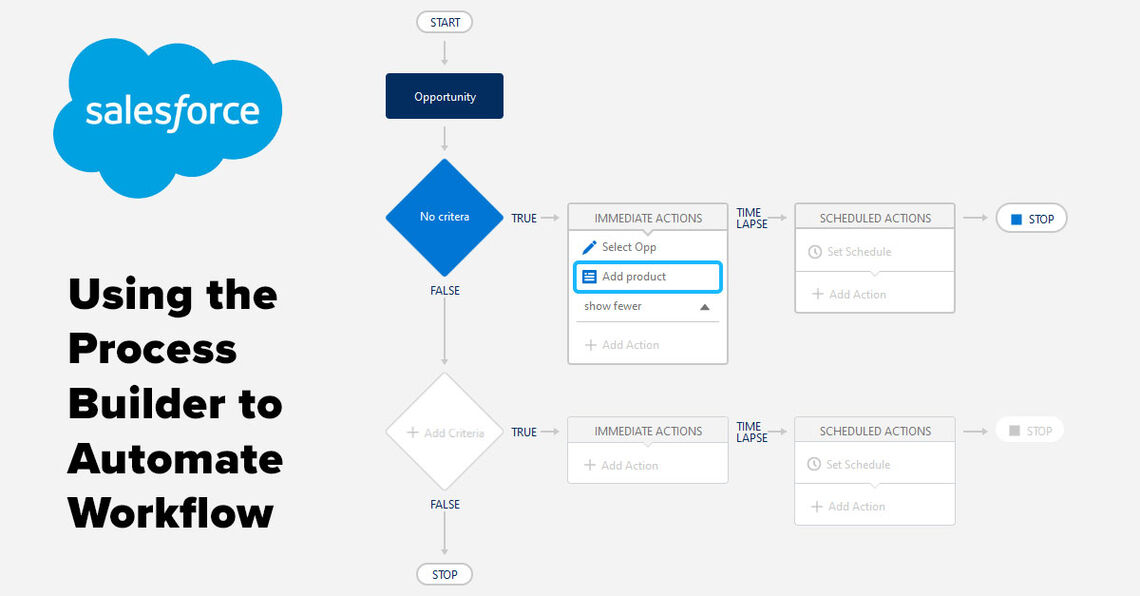
Salesforce also provides extensive email marketing automation capabilities through Salesforce Marketing Cloud. It offers a rich feature set for creating journeys, customer lifecycle campaigns, and personalized email campaigns.
The Journey Builder tool provides a central interface to map out multi-channel, multi-step engagement paths. You can set entry events and then build an automation flow using email, mobile push, direct mail, live chat, social media ads, and more. Dragging campaign elements makes it easy to visualize the path.
In addition to visual workflow builders, Salesforce enables code-level configuration for advanced implementations. Experienced marketers can leverage the full Marketing Cloud API and underlying architecture to highly customize automation behavior and integrations.
Overall, the depth and scalability of Salesforce make it suitable for complex, enterprise-grade automation across channels and segments. The steeper learning curve is offset by robust features and ultimate flexibility.
Winner: Klaviyo
While Salesforce offers industry-leading depth, Klaviyo wins for ease of use for small business owners through its straightforward visual interface and pre-built templates. It streamlines creating the most common e-commerce workflows that emerging brands need. The ability to quickly personalize and connect customer data to create targeted, automated campaigns gives Klaviyo the advantage of faster time to value.
Email Templates
Klaviyo
Klaviyo offers hundreds of professionally designed, mobile-optimized email templates to choose from for your campaigns. Templates are organized by categories like abandoned carts, welcome series, product announcements, shipping updates, and more.
The template editor makes it fast and simple to customize colors, fonts, content blocks, images, buttons, and layouts. You can preview on mobile and desktop without leaving the editor. Dynamic content tags allow you to easily personalize email content for each subscriber with customer data.
Klaviyo also offers A/B testing capabilities directly within the template editor to experiment and refine your emails. And the built-in stock image library provides quality imagery to use in emails for free.
Overall, Klaviyo streamlines email creation for e-commerce with beautiful templates tailored specifically to shopping scenarios. Between the curated designs and intuitive editing tools, brands can quickly build personalized, high-converting emails.
Salesforce
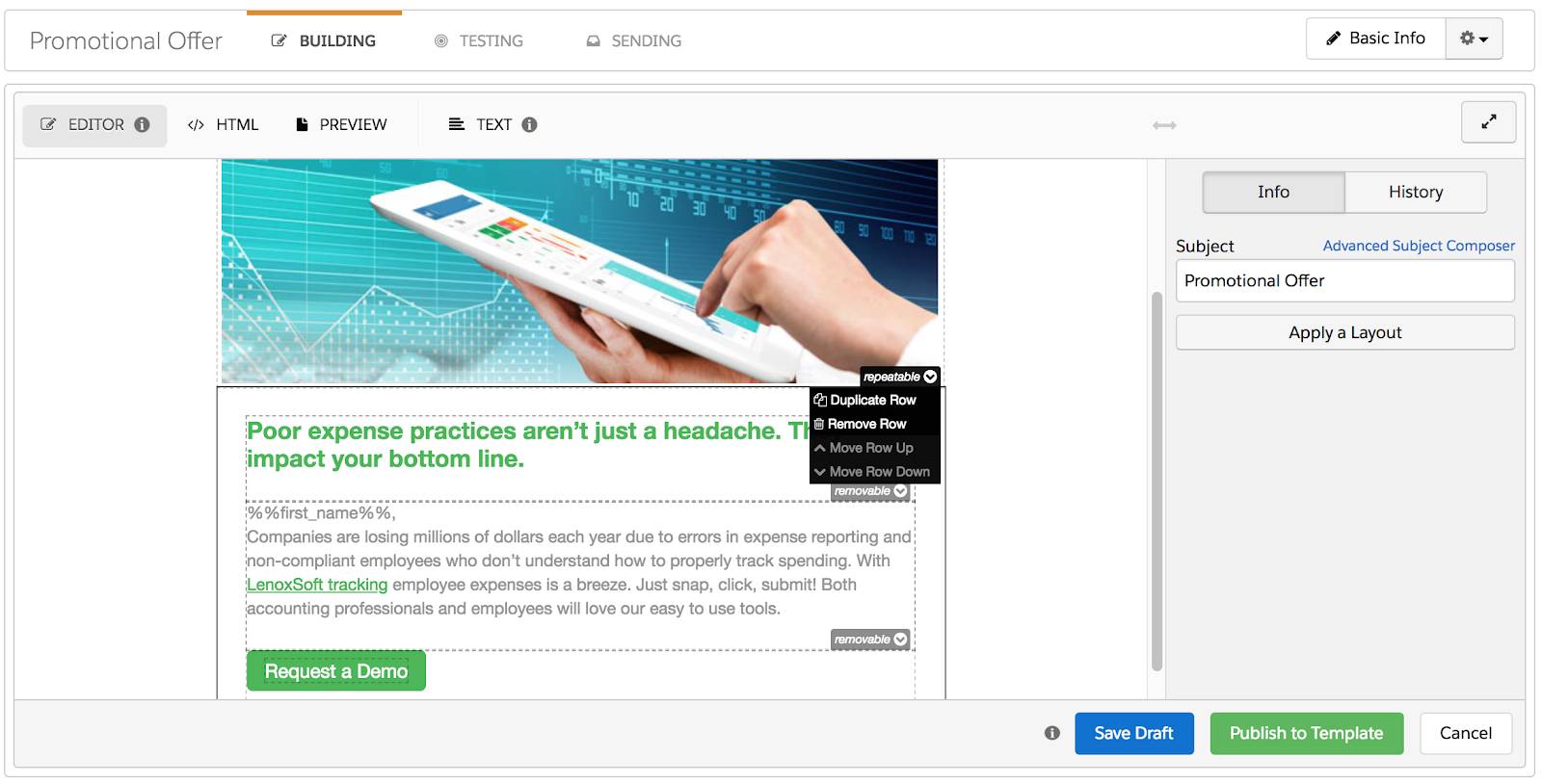
The Salesforce Marketing Cloud provides hundreds of professional email templates spanning different industries and campaign use cases. Email layouts are mobile-responsive out-of-the-box.
Within the email builder, marketers can directly edit template source code or use the drag-and-drop WYSIWYG editor. Dynamic content can be added through the content blocks sidebar or manual personalization tags. Images, colors, and fonts can all be customized as well.
More advanced email designers can leverage tools like Code View, Template Versioning, CSS Inliner, and the Guide Template Language (GTL) to enable deeper customization. Features like repeatable content blocks and scrapbooking provide more flexibility.
A/B testing of email subjects, content, and other elements is available natively to enhance deliverability and drive conversions.
Overall, Salesforce email templates offer enterprise-level customization suitable for experienced email marketers with more complex needs. The learning curve is higher but so is the ceiling for customization.
Winner: Klaviyo
For small business owners who want to quickly build professional, high-converting emails without intensive design work, Klaviyo is the winner. The combination of beautiful templates optimized specifically around shopping scenarios along with an intuitive drag-and-drop editor for fast customization makes email creation much easier.
Segmentation
Klaviyo
Klaviyo enables advanced segmentation to precisely target your messaging and campaigns. You can create custom segments based on profile attributes, and on-site behaviors like pages visited or items added to the cart, purchase activity, abandoned cart status, email engagement metrics, and more.
For example, easily made segments could include high lifetime value customers, recent purchasers, site visitors from Instagram ads, email list subscribers, or those with abandoned checkouts. Klaviyo makes it very simple to drag-and-drop filter logic statements to build even highly complex segments.
It also automatically creates and maintains segments like new subscribers from the past X days or non-openers from the last Y emails sent. Power users can leverage Javascript and Klaviyo’s API to pull in external data for segmentation as well.
Overall, granular targeting options make it possible to personalize messaging across campaigns and automation. You can deliver exactly the right content to each subscriber segment you specify.
Salesforce

Salesforce also provides extensive segmentation and targeting functionality. Marketers can leverage the built-in Segment Builder to filter contacts based on standard fields, email engagement metrics, purchase history, and more. Custom fields can be created to capture additional data for segmentation as well.
Boolean logic makes it possible to get very specific with your audience definitions. SQL querying within Reporting allows marketers to analyze behavior with more granularity as well.
Additionally, Predictive Intelligence helps discover new patterns and insights to identify high-value customer characteristics using AI. These behavioral signals can feed segment creation for more timely, personalized communications.
For enterprises, Real-Time CDP captures zero-touch customer data from all sources and unifies profiles for consistent segmentation. Audience Studio also offers segmentation by third-party data like technographics, intent, or location.
Ultimately Salesforce delivers industry-leading segmentation tools for one-to-one messaging across channels. The options do come with more complexity, but also more sophistication.
Winner: Tie
Both Klaviyo and Salesforce provide excellent segmentation, the difference lies in complexity versus ease-of-use. Klaviyo wins on simplicity for small business owners through its intuitive visual interface.
But Salesforce matches it in depth for larger teams who can leverage advanced intelligence and broader data sets to push personalization further. We declare this category a tie based on strengths aligned to user needs.
Analytics
Klaviyo
Klaviyo provides deep analytics across your email and SMS campaigns so you can optimize performance. Its centralized dashboard surfaces key metrics and trends at a glance.
You gain visibility into opens, clickthrough rates, conversions, revenue, unsubscribed, and other engagement metrics for each campaign. Klaviyo also tracks more advanced analytics like email rendering across different inbox providers. Granular behavioral data related to browsing sessions supplements campaign analytics as well.
Klaviyo’s platform makes it very easy to slice and dice your data, allowing you to uncover new insights. You can filter reports by date ranges, campaign types, customer segments, and more to analyze what’s working best for whom. Their analytics provide clear guidance on how to improve email relevance and drive more value.
For hardcore analysts, a dedicated SQL-based Klaviyo Metrics tool allows you to write custom queries across the full breadth of campaign data.
Salesforce

Salesforce also delivers powerful analytics capabilities through its Reporting and Insights tools built on top of Einstein Analytics.
Standard reports provide campaign performance visibility – opens, clicks, bounces, opt-outs, conversions, revenue, and more. Dashboards roll up real-time metrics for quick views by channel, program type, content piece, customer segment, and other filters.
Additionally, Journey Insights leverages AI to model the impact of individual messages and channels within automation paths. So you can optimize each step of complex journeys.
For more savvy analysts, Einstein Discovery finds patterns in historical campaigns and external data to provide predictive insights that feed segmentation and targeting. Custom reports, forecasting models, and streaming dashboards can also be built from scratch as needed.
The breadth of analytics combines with customizable reporting tools for deep yet accessible analysis into the heart of what’s driving marketing results. This positions teams to continually improve strategy with data.
Winner: Klaviyo
For small business owners who want easy access to campaign analytics, Klaviyo wins. Its centralized dashboard provides an intuitive snapshot of key metrics and the ability to seamlessly filter for more insights. Klaviyo surfaces 80% of what most e-commerce brands need to optimize efforts without complexity.
Salesforce does match Klaviyo’s breadth for power users but requires more experience to leverage its full analytics potential across channels. So for simplicity and convenience, Klaviyo gets the win.
Unique Features
Klaviyo
One of Klaviyo’s unique advantages is being purpose-built for e-commerce brands. As a result, several differentiators stand out. Klaviyo offers deep integration with platforms like Shopify which provides turnkey abandoned cart automation. Email and SMS flows combined with cart tracking seamlessly bring back lost sales. Another area where Klaviyo excels is SMS marketing.
In addition to best-in-class email capabilities, Klaviyo includes full support for SMS campaigns with automation, analytics, and more included out-of-the-box. Expanding reach via text comes easy.
Klaviyo Recommend leverages your first-party data combined with machine learning to dynamically serve product recommendations to each site visitor based on their behavior and preferences for maximum relevance. This feature helps lift conversion rates significantly.
Overall, the platform’s purposeful emphasis on shopping scenarios and the buying lifecycle shines through in the capabilities that deliver revenue value to online brands. The e-commerce focus shows in compelling ways throughout Klaviyo.
Salesforce

As the market leader in CRM, Salesforce offers a broader platform with enterprise-level scalability. Salesforce enables dynamic surveys and feedback forms to be created for gathering first-party data across segments to power personalization and marketing.
With Einstein Scoring, Predictive Scoring analyzes customer behavior signals to model the likelihood of engagement, conversion, or churn for every individual – shaping hyper-targeted plays.
Journey Orchestration facilitates sophisticated multi-channel coordination involving systems like service, sales, and IT to align customer experiences across touchpoints and teams. For complex organizations, Salesforce provides the glue to create cohesion across departments and unified understanding across audiences driving smarter actions in a coordinated fashion.
Winner: Klaviyo
For the direct needs of most e-commerce brands focused on conversion-driven growth, Klaviyo’s purposeful feature set targeting the buying lifecycle wins out as being easier to leverage for fast time-to-value. Salesforce certainly offers enterprise-class breadth and depth for more sophisticated teams and cross-organizational scale. But Klaviyo’s alignment to the core scenarios online brands care about set it apart.
3. Ease of Use
Klaviyo
Klaviyo is designed from the ground up to provide an intuitive user experience tailored for e-commerce marketing teams. The interface offers clarity and simplicity using clean, modern visual design principles throughout the platform.
Core features like building emails, SMS campaigns, automated flows, and analyzing results have been simplified for ease of adoption. Simple drag-and-drop workflow builders, preset templates, and customizable reporting dashboards allow both new and experienced users to drive results faster.
The platform prioritizes clarity over complexity by focusing on just the most important, highest-value tools an online merchant needs without extraneous functionality getting in the way. Klaviyo also offers detailed online support documentation, tutorials, and webinars for onboarding users at every level.
Overall, Klaviyo cuts through the sophisticated functionality with a straightforward approach so brands can focus more time crafting impactful campaigns instead of learning complex software. This simplicity makes the platform very accessible even for beginners.
Salesforce
As a large-scale CX platform built to support extensive customization, Salesforce inherently requires more training and ramp-up time to unlock value. The expansive environment means more menus, configuration options, and tools to learn.
For new users, the breadth and depth of Salesforce can prove daunting to navigate and know where to start. It works best when integrated with proper onboarding, continual education, and guided launch plans to meet business objectives. Less experienced marketers may find themselves overwhelmed even with basic capabilities.
However, for companies committed to leveraging and growing into the extensive platform over time, Salesforce provides robust scalability. The level of customization does provide ultimate flexibility but requires more effort to harness effectively. Ongoing learning commitment is key to success.
Winner: Klaviyo
While Salesforce offers industry-leading depth long-term, Klaviyo wins outright for ease of use today through its purposeful emphasis on simplifying e-commerce marketing capabilities into an intuitive, straightforward interface.
Less experienced users can ramp up quickly and focus more time on crafting great campaigns instead of figuring out software complexity. So for the fastest time to value and easiest access overall, Klaviyo stands out as the winner.
4. Email Deliverability
Klaviyo
Klaviyo prioritizes keeping customers off spam lists and inboxing at high rates. Their system is optimized for e-commerce email deliverability out-of-the-box through built-in tools and best practices.
Klaviyo offers dedicated IP addresses to avoid issues stemming from shared sending infrastructure. Automatic email authentication via SPF, DKIM, and DMARC also helps improve inbox placement.
In terms of list quality, granular targeting, segmentation, and behavioral personalization keep subscriber engagement high. Klaviyo automatically suppresses known spam traps or honey pots as well.
The platform also enables sending reputation monitoring, inbox analysis, and advanced email rendering previews across different providers. This helps you optimize messages for each inbox environment.
In total, the combination of technical email infrastructure and intelligent list management allows Klaviyo customers to achieve industry-leading inbox open rates.
Salesforce
Salesforce similarly offers authenticated, customizable email infrastructure suited for strong deliverability.
Dedicated IPs, LINK protection, compliance tools, and sender reputation monitoring all come built-in to help marketers maintain inbox placement and adhere to regulations like GDPR or CASL.
Granular customer data and flexible segmentation enable targeted, relevant messaging to each subscriber for engagement. And testing capabilities allow continuous optimization of content for higher open and clickthrough rates.
For enterprise-level senders, Salesforce also provides hands-on deliverability guidance, program benchmarking, and dedicated IP specialists to maximize reach. So larger, more sophisticated brands can shape robust and scalable email programs.
Winner: Tie
Both Klaviyo and Salesforce emphasize email deliverability with the core infrastructure and segmentation tools needed for inboxing success. They take slightly different approaches based on customer size and use case complexity. However, each platform provides what’s necessary to achieve strong open and clickthrough rates aligned to an organization’s needs. We declare this category a tie.
5. Customer Support and Community
Klaviyo
Klaviyo offers multiple tiers of customer support depending on your account plan:
The free and basic paid plans provide email support with generally very rapid first response times of under an hour. The next Pro plan adds live chat for urgent issues to get answers even faster. And enterprise-level accounts offer dedicated account management and priority phone/email support channels.
Klaviyo also fosters an extremely strong customer community for sharing best practices and networking. Some popular groups on Facebook include Klaviyo Pros with over 9,200 members and Klaviyo Ecommerce Evolved with over 53,000 members. These forums see high engagement levels and Klaviyo staff also participate actively.
Additionally, Klaviyo provides a public roadmap, status page, and comprehensive self-service knowledge base covering support articles, ebooks, how-to videos, webinars, and more that make it easy to find help on your own.
Salesforce
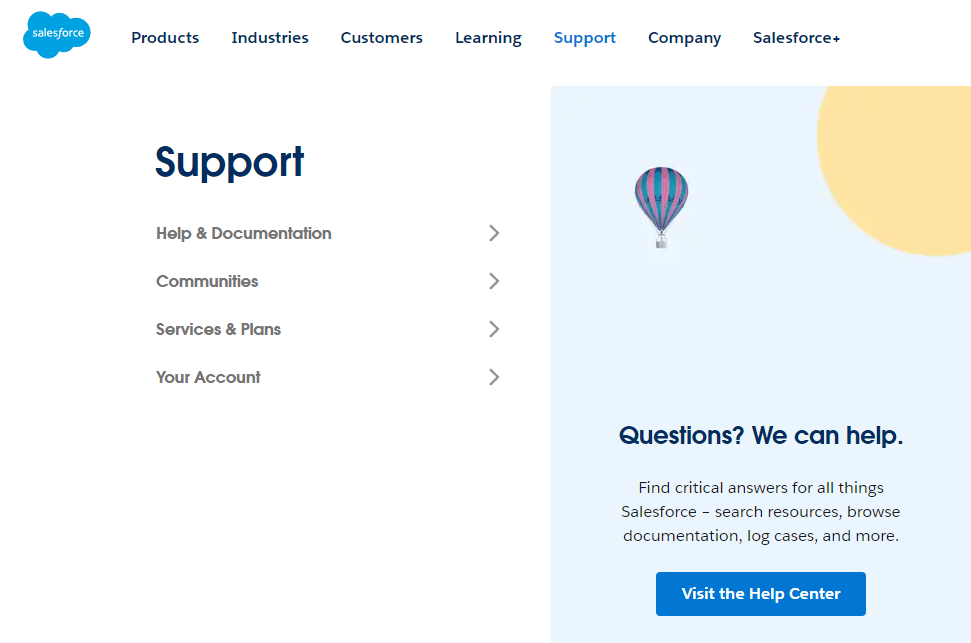
As an enterprise-level platform, Salesforce offers multiple tiers of technical support depending on a customer’s Edition and User licenses:
Developer Edition accounts have access to online documentation and Trailhead training only. All other Editions provide 24/7 chat and case management support but higher levels add faster response SLAs down to 15 minutes for critical issues on Performance Edition. Identity and System Configuration Support comes standard at higher license fees as well.
The Salesforce Success Community offers a wealth of resources with over 1 million members, but groups tend to be more Salesforce-centric rather than customer-led. Some popular groups include Salesforce Professionals with 166,000 members and Salesforce Career Support Group with 104,000 members.
Winner: Klaviyo
While Salesforce has strength in enterprise-level phone and chat channels, Klaviyo wins for its extremely engaged customer community that provides authentic support amongst users themselves.
The Klaviyo-specific groups with very active discussion and staff involvement stand out as tremendous assets for customers looking for help compared to more general Salesforce communities. So the deeper sense of community gives Klaviyo the win.
6. Integrations
Klaviyo
Klaviyo offers a wide range of integrations tailored specifically to online commerce platforms and complementary marketing tools.
For e-commerce, deep partnerships allow two-way syncing with key data flows:
- Shopify – Sync products, orders, customers, and more automatically while also embedding Klaviyo forms and popups across your storefront.
- WooCommerce / BigCommerce / Magento – Share customer and order activity between the commerce platform and Klaviyo campaigns.
Klaviyo also connects with analytics tools like Google Analytics and Segment to combine online behavior data. And 100+ marketing apps like SMS providers, live chat, payment systems, and more share data triggers across platforms.
The Klaviyo API also makes it simple to build custom solutions on top of the core experience and connects data from POS systems, warehouses, ERPs, and anywhere else. With Zapier integration, even non-technical users can easily connect 1000+ web apps.
This comprehensive set of integrations tailored for each common e-commerce tech stack delivers tremendous flexibility to unify data and systems.
Salesforce
As the market leader in CRM, Salesforce inherently offers perhaps the deepest and most broad integration capabilities through hundreds of AppExchange partner solutions.
Tight ERP integrations connect bi-directionally with systems like NetSuite, SAP, and Oracle. Powerful ecommerce platform partnerships also exist including integrations with Shopify Plus and Magento that share customer data across clouds.
For digital marketing, connections allow data and workflow unification across channels – email tools, mobile engines, social media sites, chat solutions, and more all come pre-built.
Through Mulesoft, Salesforce also enables non-technical users to build custom connections across systems involved in advanced use cases. With its vast partner and API ecosystem combined, the potential scale of integrated technology across the enterprise is unmatched.
Winner: Tie
For core e-commerce platforms, Klaviyo offers tighter first-party native integration. But Salesforce counters with the broader ability to connect marketing technology to back-office systems for more complex organizations. We declare this category a tie based on the depth and focus of each platform aligning well with customer needs.
7. Pricing
Klaviyo
Klaviyo offers simple and transparent pricing tailored for small and mid-sized online merchants. Plans are tiered by the number of contacts with rates starting at $45/month for up to 1,500 contacts. Enterprise-level pricing is customized for larger contact volumes.
All features are included in each pricing tier including email and SMS campaigns, analytics, integrations, and premium support options. You simply get full access to the platform’s capabilities no matter the plan. There are no surprise fees or complex marketing modules to decipher.
In total, Klaviyo aims to provide value and flexibility for e-commerce brands at various growth stages while simplifying the decision-making process without having to predict long-term needs upfront when requirements can evolve quickly. A free plan lets you get started at no cost as well.
Salesforce
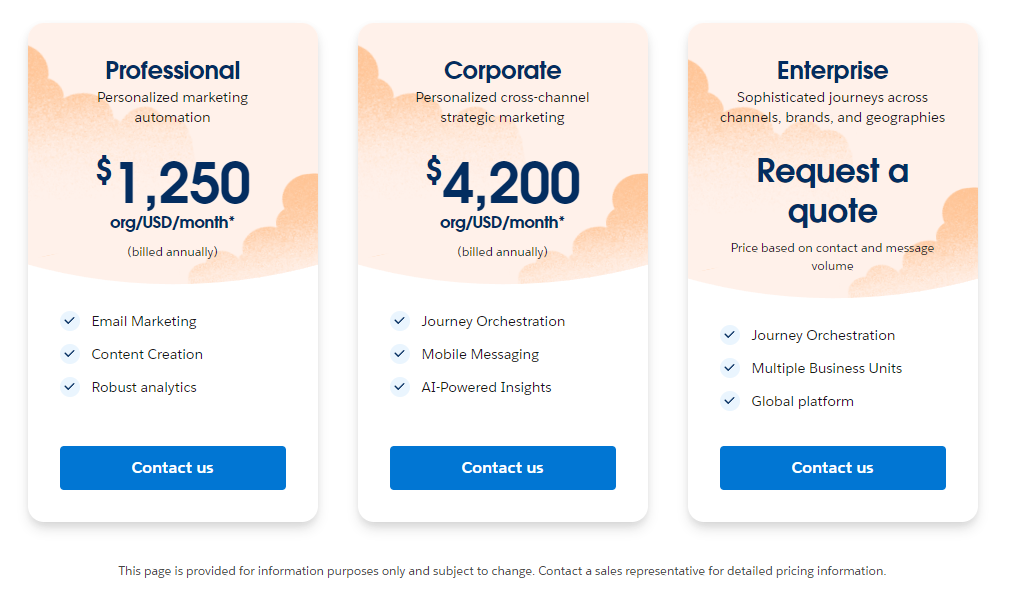
As a large-scale CX platform aimed at complex organizations, Salesforce pricing follows an elaborate model tiered across products, editions, and individual user licenses that can be confusing to navigate and budget for accuracy.
Licenses range from simple Sales Cloud access starting at $1,250/month to comprehensive packages bundling marketing, service, and sales tools for over $4,200/user/month when including support costs. Hidden fees sometimes get tacked on unexpectedly around data storage or API calls as you scale too.
Custom quotes also require coordination with account executives before pricing transparency which delays time-to-value and leaves unpredictable budgeting. For sophisticated enterprises that dedicate resources to manage and unlock ROI from Salesforce’s depth across departments, the investment pays dividends over time. However, pre-planning is key for cost visibility.
Winner: Klaviyo
The Klaviyo Salesforce Marketing Cloud comparison shows that while Salesforce delivers immense capabilities, Klaviyo wins outright for simple, transparent pricing that spells out costs upfront for customers. Their tiered plans by the number of contacts make it fast and easy to pick the right solution as your needs grow. So for predictable budgets and clear value from the start, Klaviyo takes the win.
8. Reviews and Reputation
Klaviyo
Klaviyo is highly rated across customer review sites, emphasizing the platform’s ease of use and ability to drive results for e-commerce brands.
On the popular software review site G2, Klaviyo earns a 93% satisfaction rating across hundreds of reviews. It is the #1-rated email marketing software across various buyer segments.
Positive highlights praise the intuitive interface, quality templates, automation capabilities, and excellent customer support. Negative feedback focuses on a limited mobile app, inability to natively handle direct mail, and dependency on forms/cookies for visitor identification.
On Capterra, Klaviyo earns a perfect 5/5 average user rating based on 700+ evaluations. Reviews reiterate strengths around simplicity, automation, and overall performance marketing value generated.
For online retail brands, Klaviyo strikes a chord by making robust email and SMS infrastructure highly accessible.
See Klaviyo’s reviews on G2, Capterra, and TrustRadius.
Salesforce
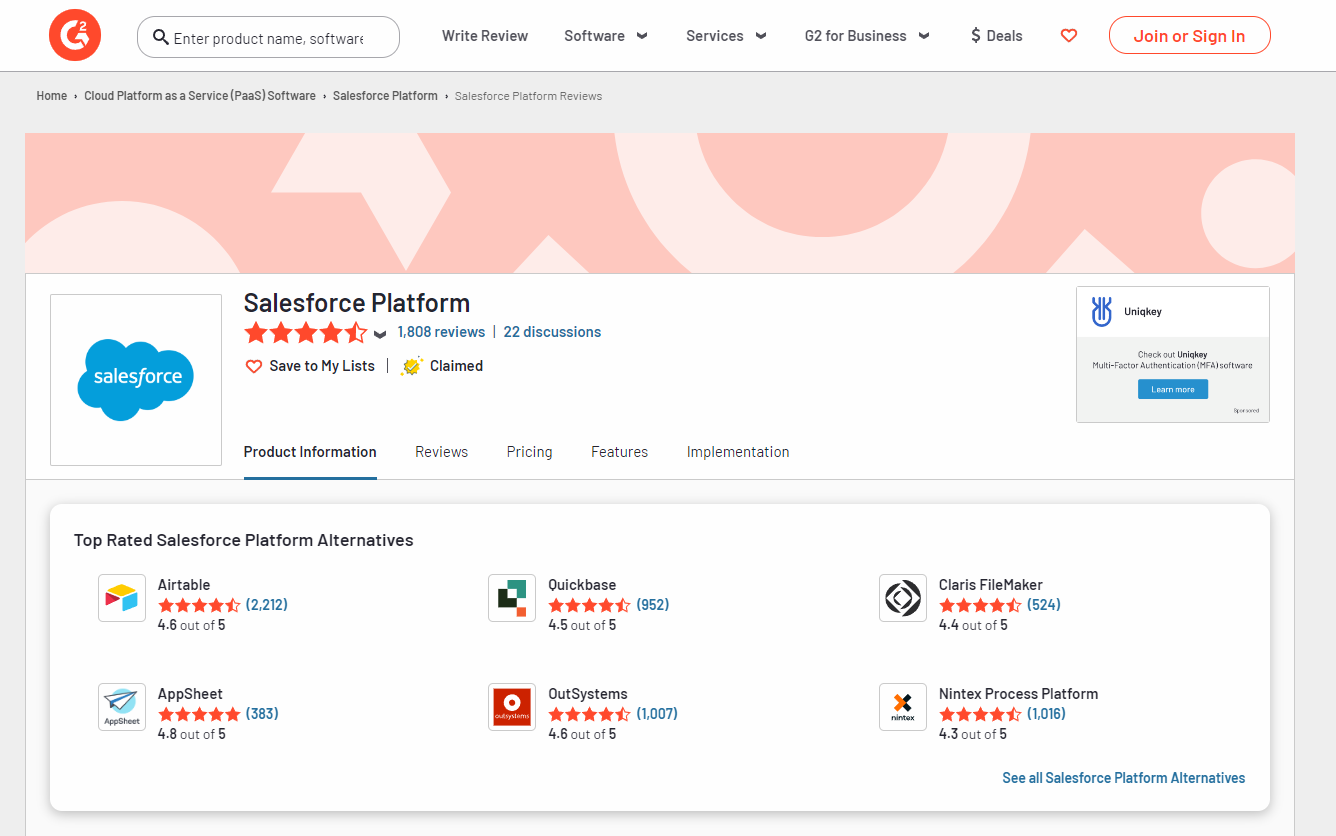
As a large enterprise software company, Salesforce earns more mixed mainstream user reviews reflecting its heavy orientation toward complex organizations.
On G2, admins and implementation specialists rate Salesforce highly for platform scalability, customization, and account management support. But end business users cite issues around steep learning curves, hidden fees, and high administrator dependence for results. There are also frequent updates that can disrupt workflows.
The complexity results in a 76% G2 satisfaction rating across 350 reviews – still respectable but lower than specialist solutions more turnkey for specific roles. Capterra evaluations average 4.5/5 among Salesforce users.
Feedback indicates that within sophisticated teams committed to specializing and continually optimizing usage, high value comes long-term from the platform’s breadth and depth across customer data, channels, and insights.
See Salesforce Marketing Cloud reviews on G2
Winner: Klaviyo
For small and mid-market online brands focused on email and SMS marketing campaign performance who want easy onboarding, Klaviyo wins. Its focused set of capabilities aligns tightly with e-commerce growth goals with an intuitive interface that speeds time-to-value.
Salesforce does provide unmatched capabilities for large cross-functional teams, but at the expense of approachability requiring greater effort. So for the average user, Klaviyo’s usability and results make it the winner.
9. Salesforce vs Klaviyo: FAQ’s
Klaviyo FAQs
- What types of businesses use Klaviyo?
Klaviyo helps businesses like direct-to-consumer e-commerce brands selling online or large enterprises by providing them with highly transactional business models. It excels for retail DTC brands, online course creators, food & beverage companies, and similar. - Does Klaviyo offer email personalization?
Yes, Klaviyo enables dynamic personalization of email content with merge tags, and custom fields, and by integrating data from your e-commerce platform to leverage transactional and behavioral data in messages. - Is Klaviyo just for email marketing?
No. In addition to powerful email capabilities, Klaviyo also provides robust SMS marketing, automation, analytics, and integrations with e-commerce platforms. But the core focus is email. - Does Klaviyo integrate with Shopify or other e-commerce platforms?
Yes, deep integrations with Shopify, BigCommerce, WooCommerce, and Magento allow two-way syncing of product catalogs, customer data, order data, and more between the e-commerce platform and Klaviyo. - Is there a free version?
Yes, Klaviyo offers a free plan for up to 500 contacts including many key features to help your business get started with basic email and SMS.
Salesforce FAQs
- What types of businesses use Salesforce?
Salesforce targets larger enterprise organizations across many industries by providing a highly scalable CX platform capable of complex, customized deployments. - Does Salesforce require extensive IT resources?
Often yes, especially for initial setup and ongoing optimization. Salesforce administrators with deeper technical expertise help manage customization, integrations, and evolving features. - What Salesforce products integrate?
Core clouds for sales, service, marketing, and commerce integrate tightly for unified CX, while platforms for MuleSoft, Slack, Tableau, and more also interoperate as part of an enterprise technology stack. - Is Salesforce easy to learn?
No. Salesforce’s extensive capabilities mean a steeper learning curve upfront and ongoing as features expand. Their online training portal Trailhead helps but still demands significant ramp-up time. - Does Salesforce offer mobile capabilities?
Yes. Salesforce provides mobile apps across its clouds to enable customer relationship management, service, task, and field management functionality for employees on the go. It also supports marketing campaigns optimized for mobile customer engagement.
Final Thoughts
Choose Klaviyo if…
You are an e-commerce company selling directly to consumers online and want to leverage email and SMS marketing to drive growth. Klaviyo provides an intuitive, purpose-built platform optimized specifically around key e-commerce scenarios like automated post-purchase and abandoned cart flows.
The combination of powerful yet simple capabilities with ease of use makes it easy to ramp up campaigns that convert.
However, if you feel like Klaviyo may not be the best option for what you need from an email marketing platform, I recommend reading my Klaviyo alternatives article to find one that’s a better choice.
Choose Salesforce if…
You are an enterprise organization needing maximum customization and cross-departmental alignment tied to a unified customer data foundation for marketing insights and engagement.
Salesforce delivers immense breadth and depth capable of connecting CX ecosystems across sales, service, e-commerce, and more. While bringing more complexity, the enterprise-grade scalability enables sophisticated teams to inform and integrate processes company-wide.
Whichever platform you choose, make sure it aligns strategically with your resources and growth goals for business value. Please ask us any questions in the comments below if you want help assessing what solution best fits your needs!
